Reinforce your understanding of LPN/LVN nursing skills — and prepare for the NCLEX-PN® exam! Corresponding to the chapters in Foundations of Nursing, 9th Edition, this study guide provides a variety of exercises to help you review, practice, and apply nursing concepts and principles. Review questions make it easier to achieve the chapter objectives from the textbook, and critical thinking activities help you develop clinical judgment skills. Now with Next Generation NCLEX® (NGN)-style case studies and questions, this guide provides you with an effective study tool for the NGN exam.
Study Guide for Foundations of Nursing, 9th Edition
KSh 7,280.00
Reinforce your understanding of LPN/LVN nursing skills — and prepare for the NCLEX-PN® exam! Corresponding to the chapters in Foundations of Nursing, 9th Edition, this study guide provides a variety of exercises to help you review, practice, and apply nursing concepts and principles. Review questions make it easier to achieve the chapter objectives from the textbook, and critical thinking activities help you develop clinical judgment skills. Now with Next Generation NCLEX® (NGN)-style case studies and questions, this guide provides you with an effective study tool for the NGN exam.
2 in stock
Related products
-
Applying the Nursing Process: A Tool for Critical Thinking 7th Edition
KSh 17,850.00Enhance clinical judgment with Applying the Nursing Process: A Tool for Critical Thinking, 7th Edition. Learn step-by-step assessment, planning, and evaluation skills for effective patient care.
This trusted resource combines the practical guidance students need to understand each phase of the nursing process with an emphasis on critical thinking, focusing on both independent and collaborative responsibilities facing today’s nurses. Using straightforward language, abundant examples, and real case scenarios, the book addresses the nurse’s role as a caregiver and decision-maker in a range of settingsfrom clinic to the home, community, research, and acute care arenas. A new focus and design help readers build essential critical thinking and problem solving skills and apply them within the nursing process framework.
A companion Website provides a variety of tools such as patient self-assessment tool, clinical decision map, NCLEX® resources, and much more.
-
Myles Textbook for Midwives, International Edition, 17th Edition
KSh 5,642.00Written by midwives for midwives, Myles Textbook for Midwives has been the seminal textbook of midwifery for over 60 years. It offers comprehensive coverage of topics fundamental to 21st midwifery practice. Co-edited for the second time, by internationally renowned midwife educationalists, Professor Jayne E Marshall and Maureen D Raynor from the United Kingdom with a team of contributors from across the midwifery community it retains its clear, accessible writing style. Most chapters provide useful case studies, websites of key organisations and charities for individuals to access further information. Reflective questions at the end of each chapter as well as annotated further reading aid reflective learning and stimulate discussions relating to continuing professional development.
Key Features-
- The book covers key frameworks that govern midwifery practice, exploring ethical and legal frameworks that are essential to every accountable, autonomous, professional midwife.
-
- Includes employer-led models of supervision, vital elements of leadership and clinical governance that supports the provision of high quality maternity services and standards of midwifery practice.
-
- The concept of resilience is introduced for the reader to contemplate their personal contribution in creating an environment that is conducive to protecting the wellbeing of themselves and colleagues within the workplace.
-
- The text covers the UN 2030 Agenda for Sustainable Development, highlighting the importance of midwives as global citizens with common goals, and together they form a strong global community prepared to challenge social inequalities and take action to help end extreme poverty.
-
- Covers designing and implementing high quality midwifery care using evidence, policy and models of care. Highlights why a holistic and evidence-informed approach is necessary to achieve effective care for all. Working examples will help the reader to think critically about their own practice.
-
- For this edition several new chapters are introduced covering concealed pregnancy, fear of childbirth (tocophobia), care of the acutely unwell woman and end of life issues including rights of the fetus/neonate and ethical considerations.
Author InformationEdited by Jayne E. Marshall, FRCM, PFHEA, PhD, MA, PGCEA, ADM, RM, RN, Foundation Professor of Midwifery and NMC Lead Midwife for Education, School of Allied Health Professions, College of Life Sciences, George Davies Centre, University of Leicester, UK and Maureen D. Raynor, MA PGCEA ADM RMN RN RM, Senior Lecturer (Midwifery), De Montfort University, Faculty of Health and Life Sciences, School of Nursing and Midwifery, Leicester, UK -
-
Applying the Nursing Process: A Tool for Critical Thinking
KSh 17,835.00This trusted resource combines the practical guidance students need to understand each phase of the nursing process with an emphasis on critical thinking, focusing on both independent and collaborative responsibilities facing today’s nurses. Using straightforward language, abundant examples, and real case scenarios, the book addresses the nurse’s role as a caregiver and decision-maker in a range of settingsfrom clinic to the home, community, research, and acute care arenas. A new focus and design help readers build essential critical thinking and problem solving skills and apply them within the nursing process framework.
A companion Website provides a variety of tools such as patient self-assessment tool, clinical decision map, NCLEX® resources, and much more.
-
Nursing Foundation: Concepts and Perspectives
KSh 6,580.00The book under title ‘Nursing Foundation: Concepts and Perspectives’ has been written in lucid style, simple language and with goal-oriented outlook. It will help the students of undergraduate nursing programme at the post basic level which is a broad based education within an academic framework, to develop understanding of philosophy, objectives, responsibilities of nursing profession; to build upon the skills and competence acquired at the diploma level. It will orient them to the current concepts involved in practice of nursing and developments in nursing profession; direct to upgrade their critical thinking skills, competencies and standards required for practice of professional nursing and to follow nursing process. This book provides up-to-date information in accordance with the latest syllabus prescribed to them and they will be able to identify professional, ethical, and legal aspects of nursing profession, current trends in health and nursing and steps of nursing process. Each chapter deals with a specific aspect of foundation of nursing with complete clarity of expression, simplicity to exposition, intensive text and adequate illustrative material in the form of diagrams, flow charts and tables followed by key points, chapter end questions comprising of essay type questions, short answer questions and multiple choice questions at the end of each chapter. The chapters have been sequenced to facilitate ease and continuity in reading and understanding, and at the end of each chapter, related references have been given as suggested reading.
-
An Introduction to Forensic Genetics, 2nd Edition
KSh 16,198.00This is a completely revised edition of a comprehensive and popular introduction to the fast moving area of Forensic Genetics. The text begins with key concepts needed to fully appreciate the subject and moves on to examine the latest developments in the field. Now illustrated in full colour throughout, this accessible textbook includes numerous references to relevant casework. With information on the full process of DNA evidence from collection at the scene of a crime to presentation in a legal context this book provides a complete overview of the field.
Key Features:
- Greater in-depth coverage of kinship problems now covered in two separate chapters: one dealing with relationships between living individuals and the other covering identification of human remains.
- New chapter on non-human forensic genetics, including identification of bacteria and viruses, animals and plants.
-
Myles Textbook for Midwives African Edition, 3rd Edition
KSh 4,914.00The edition of this seminal textbook, Myles Textbook for Midwives, has been extensively revised and restructured to ensure that it reflects current midwifery practice, with an increased focus on topics that are fundamental to midwifery practice today. The book comes with Elsevier EVOLVE ancillaries – an online learning package which consists of 500 self-assessment questions and answers and a fully downloadable image bank.
- Designed to enable midwifery practitioners to provide safe and competent care, which is tailored to the patient’s individual needs
- Extensively illustrated to assist visual learning with additional ‘pull out’ textboxes to highlight key information
- Streamlined chapters with similar themes and approach help consolidate learning
- Reflects all modern midwifery curricula by presenting a strong emphasis on evidenced-based practice and the use of technology
- Over 500 on-line multiple-choice questions to enable readers to test their knowledge
- Offers a full image bank of downloadable illustrations to assist with personal projects and/or further learning
- References, Further Reading and Useful Websites promote further learning
- Glossary of Terms and Acronyms provide simple definitions of more complex terminologies
- Full colour illustrations now used throughout the book, in response to student feedback
- Contains many new chapters, some of which are authored by members of the multi-professional team
- Up-to-date guidance on professional regulation, midwifery supervision, legal and ethical issues, risk management and clinical governance
- Recognition that midwives increasingly care for women with complex health needs, in a multicultural society
- Examination of the dilemmas involved in caring for women with a raised body mass index
- Chapter on optimising care of the perineum for women with perineal trauma, including those who have experienced female genital mutilation
- Guidance to support the trend for midwives to undertake the neonatal physical examination of the healthy term infant
- Additional coverage of basic neonatal resuscitation
-
Nelson Textbook of Pediatrics_vol 1
KSh 12,000.00The worlds most trusted pediatrics resource continues to provide the most authoritative coverage of the best approaches to care in this streamlined new edition. With two new editors, extensive updates, and expanded online features, youll have the well-rounded, up-to-date guidance you need to offer your patients the very best. ? Stay current on recent developments and hot topics such as melamine poisoning, long-term mechanical ventilation in the acutely ill child, sexual identity and adolescent homosexuality, age-specific behavior disturbances, and psychosis associated with epilepsy. ? Tap into substantially enhanced content with world-leading clinical and research expertise from two new editors Joseph W. St. Geme III, MD, and Nina F. Schor, MD, PhD who contribute on key subspecialties, including pediatric infectious disease and pediatric neurology. ? Manage the transition to adult healthcare for children with chronic diseases through discussions of the overall health needs of patients with congenital heart defects, diabetes, and cystic fibrosis. ? Recognize, diagnose, and manage genetic conditions more effectively using an expanded section that covers these diseases, disorders, and syndromes extensively.
-
Wong’s Essentials of Pediatric Nursing
Awarded first place in the 2017 AJN Book of the Year Awards in the Child Health category. Known for its accuracy, evidence-based focus, and engaging writing style, Wong’s Essentials of Pediatric Nursing, 10th Edition has been the #1 title in the pediatric nursing market since it first published in 1980! Thoroughly revised to equip you with the latest research and guidelines for treating children today, it encourages a whole-body approach by beginning with child development and health promotion to better understand the later chapters on specific health problems. A new chapter featuring all systems cancers provides comprehensive information in one place. Nursing Care Plans now incorporate additional case studies to personalize interventions and promote critical thinking.
A developmental approach clearly identifies key tasks, influences, and differences at each stage of a child’s growth to help students provide appropriate, individualized care for each child.
UNIQUE! Critical thinking case studies allow you to test and develop your analytical skills in a variety of clinical situations.
UNIQUE! Quality Patient Outcomes content in Nursing Care Management discussions for major diseases and disorders helps you understand how the care you provide directly impacts patient safety and promotes positive outcomes.
Updated genetic content in the Developmental and Genetic Influences on Children chapter addresses rapidly changing and important information as it relates to children in health and illness.
UNIQUE! Family focus includes a separate chapter on the role of the family in child health, family content throughout the text, and Family-Centered Care boxes that highlight information on patient teaching, home care, and incorporating the family in the child’s care.
UNIQUE! Translating Evidence into Practice boxes focus your attention on the application of research and critical thought processes to support and guide the outcomes of nursing care.
UNIQUE! Atraumatic Care boxes guide you through performing procedures in a caring manner, promoting more positive experiences for children, families, and nurses.
Drug Alerts throughout the text emphasize important drug information and point out potential safety issues.
An emphasis on wellness offers health promotion and injury prevention strategies for each age group.
Community Focus boxes provide resources and guidance on caring for children outside the clinical setting.
Nursing Care Plans, including Nursing Diagnoses, Patient/Family Goals, Nursing Interventions/Rationales, and Expec1ted Outcomes, provide you with a model for planning patient care.
Research Focus boxes help you remain abreast of current studies that impact pediatric nursing today.
Cultural content, integrated throughout the text and highlighted in Cultural Considerations boxes, exposes you to customs and beliefs of different cultures that influence child care, enhancing your ability to provide quality nursing care to ALL children and their families.
Nursing Tips throughout the text offer helpful hints and practical, clinical information of a non-emergency nature.
Nursing Alerts throughout the text provide you with critical information that must be considered in providing care.
UNIQUE! Emergency Treatment boxes serve as a quick reference in critical situations.
Nursing Care Guidelines boxes provide you with clear, step-by-step, detailed instructions for performing specific skills or procedures.
NEW! Updated content throughout, notably methods of measuring competency and outcomes (QSEN and others), ambiguous genitalia, pediatric measurements, guidelines, and standards as defined by the American Academy of Pediatrics, and clear definitions of adolescent and young adult, keeps you up-to-date on important topic areas.
NEW! The Child with Cancer chapter includes all systems cancers for ease of access.
NEW and UPDATED! Case Studies now linked to Nursing Care Plans to personalize interventions, while also providing questions to promote critical thinking.

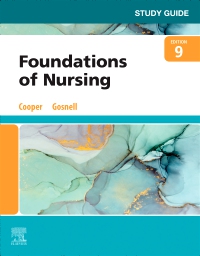
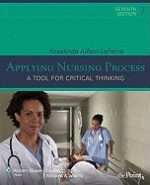
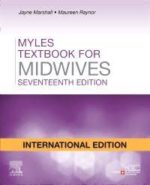
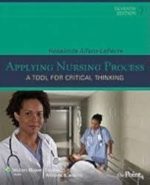
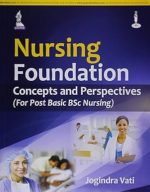

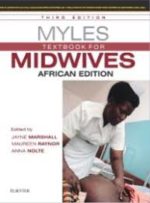
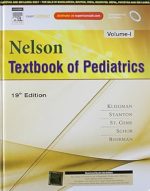

Be the first to review “Study Guide for Foundations of Nursing, 9th Edition”